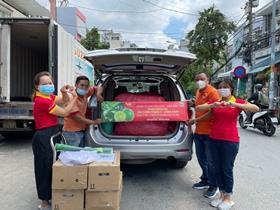
After more than a year of successfully suppressing the Covid-19 virus, Vietnam is facing a difficult period with a recent outbreak.
From January 2020 through early May 2021, Vietnam only recorded around 2,500 infections in total and 35 deaths. Unfortunately, since Mid-May, Vietnam has been facing its most serious Covid outbreak so far, with about 100-200 cases per day.
In Europe, these numbers would be a signal that the crisis is over, but for Vietnam they are alarming. With a population of 100m people, most of them living in densely populated areas with three generations often in one household, the government and the Vietnamese people are trying very hard to get Covid under control and to bring the case numbers back down to zero.
While most wealthy nations are getting their populations vaccinated, for countries like Vietnam, vaccines will only become available after the developed economies have vaccinated their populations. So far, Vietnam has received about 2.5m vaccine doses through the WHO Covax programme. Most of these have been used to vaccinate people working in the health and hospital sector.
Until the vaccines become available in large numbers for Vietnam, the control strategy centres on ‘social distancing’, ‘testing and tracing’ and following strict quarantine rules. If a person is diagnosed with Covid in a certain building or street, the whole building or street is completely quarantined, and everyone living in the area is tested. On average, for every person diagnosed with Covid, about 1,000 people will go into quarantine.
Those who are quarantined in their street or building depend on family, relatives or online shops to get their food. A sudden surge in people ordering groceries online leaves supermarkets struggling to cope with demand. For lower income people, online shopping is not an option, and they struggle to access their food.
Everywhere in Ho Chi Minh City and in cities like Can Tho, private initiatives have begun to set up market stalls close to the quarantined areas offering free food. These stalls are called “Cho 0 Dong”, which means “Zero Vietnam Dong markets”.
As one of Vietnam’s leading fruit companies, The Fruit Republic is supporting these excellent initiatives by delivering citrus to “Zero Vietnam Dong” free. Every day, The Fruit Republic’s delivery teams transport citrus fruits such as limes to many “Cho 0 Dong” stalls in Ho Chi Minh City and Can Tho. Daily deliveries are also provided to grassroot organisations like the ‘Vietnam Women Union’, and to the local governmental ‘People Committees’, which are distributing food to poor households. With their high Vitamin C content, citrus fruits like limes can help people to strengthen their immune system.



